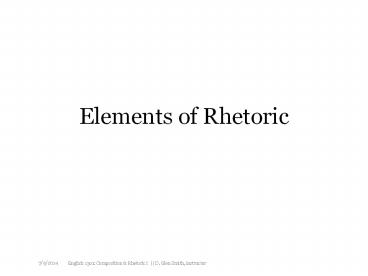Elements%20of%20Rhetoric - PowerPoint PPT Presentation
Title:
Elements%20of%20Rhetoric
Description:
Appeals in Writing. Three Types of Appeals Exist. These are rhetorical devices used to enhance observations in research papers: A. logos (rational) – PowerPoint PPT presentation
Number of Views:80
Avg rating:3.0/5.0
Title: Elements%20of%20Rhetoric
1
Elements of Rhetoric
2
Definition
- Rhetoricis the art of using language to
communicate effectively and has been a major part
of Western education since the Ancient Greeks.
3
Appeals in Writing
- Three Types of Appeals Exist
- These are rhetorical devices used to enhance
observations in research papers - A. logos (rational)
- B. pathos (emotional )
- C. ethos (ethical )
4
Purposes
- These are similar to the different purposes for
papers - inform, persuade, speculate, entertain,
incite, instigate - All three of these purposes (logos, pathos,
ethos) can be merged into one paper the longer
the work, the greater the necessity for multiple
intentions. - Likewise, just as one essay can fulfill multiple
purposes, one essay can use multiple appeals the
purpose of the work controls the type of appeal
in use.
5
Pathos (emotional)
- When using a persuasive purpose, an
emotional appeal works best. - Emotional, personal writing produces a reaction
from the audience. - In this fashion, for personal essays, pathos
works best to connect with readers. - When analyzing an emotional appeal, look
carefully at the writers emotionally charged
words and the nature of their use.
6
Pathos (emotional)
- When reading an emotional appeal, be sure to
determine - What emotion is the writer wanting you to
feel? - What manner is figurative language being
used? - Is the audience being manipulated?
- Is the emotion consistent with the
purpose? - Is the emotion appropriate to the
audience, the situation, and the subject? - Is the emotion a dominant part of the
essay (which shows a bias) or do rational
arguments appear the main focus? - Is the emotional material used to clarify
a complex argument?
7
Pathos (emotional)
- Some theorists believe emotional defenses are
stronger than logical defenses. - When used appropriately the audience
feels sympathy to the writers cause. - However, it is best to avoid loaded
language or emotionally charged phrases. - If used incorrectly, the material shown
can be seen as sentimental and forced. - If over-used, the audience may feel
manipulated. - Do not over exaggerate in order to build
a sense of empathy.
8
Pathos (emotional)
- Example of pathos-driven material
- The wrath of God is like great waters that are
dammed for the present they increase more and
more, and rise higher and higher, till an outlet
is given and the longer the stream is stopped,
the more rapid and mighty is its course, when
once it is let loose. It is true, that judgment
against your evil works has not been executed
hitherto the floods of God's vengeance have been
withheld but your guilt in the mean time is
constantly increasing, and you are every day
treasuring up more wrath the waters are
constantly rising, and waxing more and more
mighty and there is nothing but the mere
pleasure of God, that holds the waters back, that
are unwilling to be stopped, and press hard to go
forward. If God should only withdraw his hand
from the flood-gate, it would immediately fly
open, and the
9
Pathos (emotional)
- fiery floods of the fierceness and wrath of
God, would rush forth with inconceivable
fury, and would come upon you with omnipotent
power and if your strength were ten thousand
times greater than it is, yea, ten thousand
times greater than the strength of the stoutest,
sturdiest devil in hell, it would be
nothing to withstand or endure it. - Jonathan Edwards, Sinners in the Hands
of an Angry God delivered July 8, 1741 in
Enfield, Connecticut
10
Logos (rational)
- Using a rational appeal requires a burden of
proof, or claim. - Academic writing requires evidence to back up
observations - records, statistics, facts, quotes from
authorities - Your thesis statement is logos-driven.
- Your evidence is fact-based, without an overt
bias, shown in clear language.
11
Logos (rational)
- Most importantly, avoid fallacies mistaken
logic, based on a flawed argument - Avoid
- faulty ad hoc reasoning
- present only one side to an argument
- falsify information (fake credentials)
- provide weak induction or deduction
- red herrings (mislead or distract reader from
main point of discussion) or straw man
techniques.
12
Logos (rational)
- Red Herrings see Texas State University
web site for examples
http//www.txstate.edu/philosophy/resources/fallac
y-definitions/Red-Herring.html - Straw Man misrepresent your opponents view
points or draw attention away from your weaker
argument by pointing out other issues commonly
used with an audience with limited information on
the full argument
13
Logos (rational)
Example of logos-driven material Mark Anthony Friends, Romans, countrymen, lend me your earsI come to bury Caesar, not to praise him.The evil that men do lives after themThe good is oft interred with their bonesSo let it be with Caesar. The noble Brutus 5Hath told you Caesar was ambitiousIf it were so, it was a grievous fault,And grievously hath Caesar answer'd it.Here, under leave of Brutus and the restFor Brutus is an honourable man 10So are they all, all honourable menCome I to speak in Caesar's funeral.He was my friend, faithful and just to meBut Brutus says he was ambitiousAnd Brutus is an honourable man.He hath brought many captives home to RomeWhose ransoms did the general coffers fillDid this in Caesar seem ambitious?When that the poor have cried, Caesar hath weptAmbition should be made of sterner stuffYet Brutus says he was ambitiousAnd Brutus is an honourable man. You all did see that on the LupercalI thrice presented him a kingly crown,Which he did thrice refuse was this ambition? Yet Brutus says he was ambitiousAnd, sure, he is an honourable man. I speak not to disprove what Brutus spoke,But here I am to speak what I do know.You all did love him once, not without causeWhat cause withholds you then, to mourn for him? O judgment! thou art fled to brutish beasts,And men have lost their reason. Bear with meMy heart is in the coffin there with Caesar,And I must pause till it come back to me. William Shakespeare, The Life and Death of Julius Caesar Act III, Scene II Yet, notice although Anthony begins to seemingly open a logical argument against Caesar, by line thirteen, he shifts to using a heavy pathos-driven value claims to manipulate and incite the crowd against Brutus.
14
Logos gt Five Types of Claims
- Rational appeals utilize different types of
claims. - 1. factual claim declarative sentence that
states - a current reality
- Austin is the capital of Texas.
- a future condition
- The US plans to colonize Mars by 2030.
- a past event
- Vikings discovered the New World hundreds of
years before Columbus.
15
Logos gt Five Types of Claims
- 2. value claim opinion based declarative
promoting personal feelings or tastes, - detailing preference between two objects, people,
situations. - The book, Ulysses, is James Joyces strongest,
and most complex, novel.
16
Logos gt Five Types of Claims
- 3. a moral claim is made on the basis of a
prescribed code of values - (not necessarily religious)
- Despite the school boards intentions, teaching
creationism in a high school science class does
not offer a well-rounded education.
17
Logos gt Five Types of Claims
- 4. causal claims asserts and defines causes for
an event or situation - Slavery was only one cause of the American
Civil War.
18
Logos gt Five Types of Claims
- 5. deliberative claim a declarative sentence
which asserts something shouldor should not be
done. - Capital punishment is a necessary deterrent to
crime and should continue as a part of Texas
legal process.
19
Ethos (ethical)
- Ethos is the most complicated portion of the
rhetorical process - applies to good debate tactics and public
speaking - borders on philosophical approaches to your
particular life values and at the same time
establishes your tone of authorityin an honest
fashion - you display ethical behavior while presenting the
various sides of an argument - avoidance of plagiarism or theft of another
writers ideas
20
Ethos (ethical)
- An Ethical Writer
- presents both sides of the issue in a parallel
fashion seeks out a compromise between the two
sides and allows equal time for different points
of view (see Rogerian Method) - provides multiple resources in accurate fashion
to show a sense of authority - when appropriate, supplies credentials as defense
- does not sentimentalize the argument with
excessive pathos - can challenge other ideas in non-offensive manner
- maintains good intentions throughout paper
- presents tone of honesty and good-will, avoiding
sarcasm, condescension, and bullying
21
Logos, Pathos, Ethos
- Using as an example Mortimer Adlers essay How
to Mark a Book, notice how he combines all three
types of appeals in his argument - Logos defines reading process, ownership of
books, active reading, and also supplies seven
steps for marking books - Pathos states reading is conversation implies
you are what you read - Ethos establishes himself as authority on
reading compromises in friendly fashion































